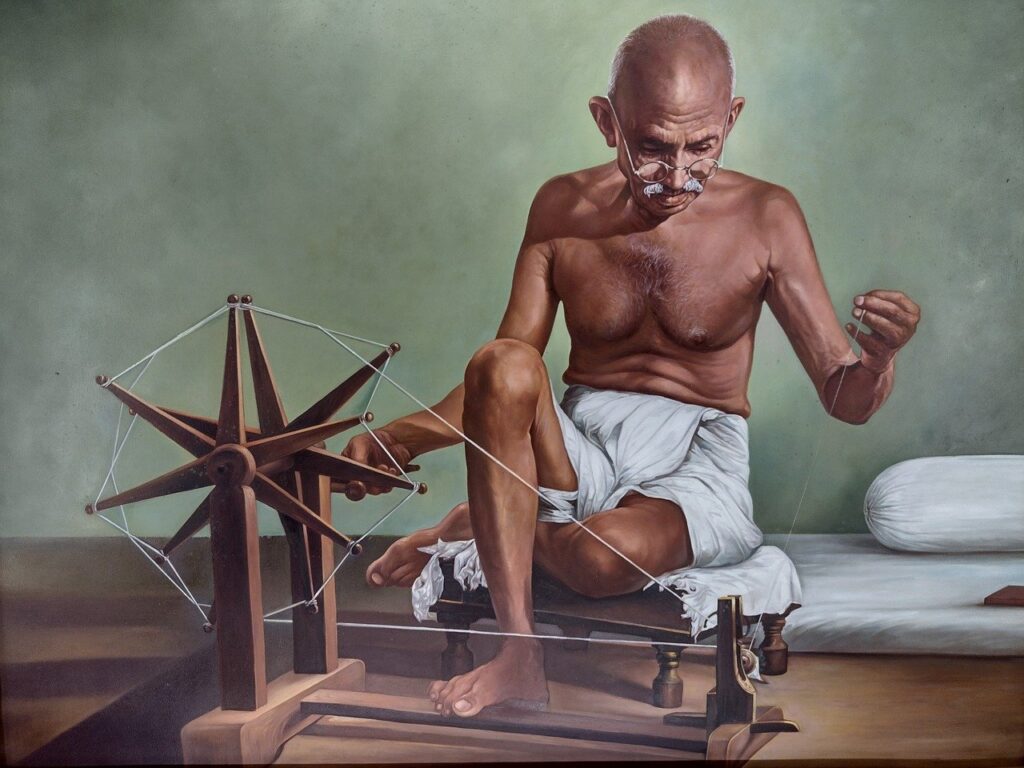Introduction
Mahatma Gandhi, fondly remembered as the father of the Indian nation, was a beacon of resilience and non-violence. Born Mohandas Karamchand Gandhi, his philosophy of Satyagraha and steadfastness in the face of adversity made him a pivotal figure in India’s struggle for independence. Gandhi’s life story is not just a tale of political struggle but a profound lesson in resilience, courage, and moral integrity. His journey from a small town in India to leading a massive non-violent resistance against the British Empire is an inspiring narrative of determination and unwavering spirit.

Early Life and Struggles
Born on October 2, 1869, in Porbandar, a coastal town in present-day Gujarat, India, Gandhi’s early life was marked by simplicity and strict adherence to religious values. His father, Karamchand Gandhi, served as the chief minister of Porbandar, while his mother, Putlibai, was deeply religious, instilling in Gandhi the virtues of honesty and non-violence.
As a young boy, Gandhi was shy and introspective. His early education was unremarkable, and he struggled to find his footing academically. However, a turning point came when he traveled to London in 1888 to study law. The cultural shock and initial struggles to adapt were significant, but Gandhi’s resilience saw him through. He eventually became a qualified barrister and returned to India in 1891.
However, his legal career in India did not flourish, leading him to accept a year-long contract to work in South Africa. It was here that Gandhi faced blatant racial discrimination, an experience that galvanized his resolve to fight for justice. The infamous incident at Pietermaritzburg, where he was thrown off a train for refusing to move from a first-class carriage despite holding a valid ticket, marked the beginning of his lifelong struggle against injustice and inequality.
Career Highlights and Achievements
Gandhi’s 21-year stay in South Africa was instrumental in shaping his political and social philosophy. He organized the Indian community to resist discriminatory laws and laid the foundation for his principle of Satyagraha, or non-violent resistance. His efforts bore fruit, leading to significant reforms in the treatment of Indian immigrants in South Africa.
Returning to India in 1915, Gandhi’s influence quickly grew. He led several significant campaigns, including the Champaran and Kheda agitations, which addressed the plight of impoverished farmers oppressed by colonial landlords. His ability to mobilize masses through peaceful protests and civil disobedience became his hallmark.
The Salt March of 1930 stands out as a pivotal moment in Gandhi’s career. In defiance of the British monopoly on salt, Gandhi led a 240-mile march to the Arabian Sea, where he made salt from seawater, symbolizing the Indian populace’s self-reliance and defiance. This act of non-violent protest garnered global attention and significantly weakened British authority.
Gandhi’s role in the Quit India Movement of 1942 further cemented his status as a leader of the masses. Despite facing imprisonment and repression, his call for “Do or Die” resonated deeply, sparking widespread acts of civil disobedience. His tireless efforts were instrumental in India achieving independence on August 15, 1947.
In addition to his political achievements, Gandhi’s contributions to social reform were profound. He championed the cause of untouchables, whom he called Harijans or children of God, and worked tirelessly to eradicate the deep-seated social evil of untouchability. His emphasis on self-sufficiency, rural development, and communal harmony laid the foundation for a more equitable society.
Life Lessons and Inspirational Quotes
Gandhi’s life offers a treasure trove of lessons in resilience, leadership, and moral integrity. One of the most significant lessons is the power of non-violence and peaceful resistance. His philosophy of Satyagraha teaches that true strength lies in the ability to endure suffering without retaliation. As Gandhi famously said, “Non-violence is the greatest force at the disposal of mankind. It is mightier than the mightiest weapon of destruction devised by the ingenuity of man.”
Another critical lesson from Gandhi’s life is the importance of truth and transparency. His autobiography, “The Story of My Experiments with Truth,” is a testament to his unwavering commitment to honesty and self-reflection. He believed that truth and non-violence are intertwined and that one cannot exist without the other.
Gandhi’s resilience in the face of adversity is another profound lesson. Despite numerous imprisonments, personal hardships, and the monumental task of leading a non-violent struggle against a powerful empire, he never wavered in his resolve. His belief that “Strength does not come from physical capacity. It comes from an indomitable will” is a powerful reminder of the inner strength required to overcome challenges.
Gandhi also emphasized the importance of simplicity and self-reliance. His advocacy for Swadeshi, the use of locally produced goods, was a call for economic independence and self-sufficiency. His own life, characterized by simple living and high thinking, serves as a model for leading a life of contentment and purpose.
Moreover, Gandhi’s teachings on communal harmony and religious tolerance are highly relevant in today’s world. He firmly believed in the unity of all religions and worked tirelessly to bridge communal divides. His principle that “The best way to find yourself is to lose yourself in the service of others” underscores the importance of empathy and selfless service.
Conclusion
Mahatma Gandhi’s life is a testament to the power of resilience, non-violence, and moral integrity. His journey from a shy, struggling young man to a global icon of peace and justice is an inspiring narrative of perseverance and unwavering faith in truth. Gandhi’s teachings and principles continue to resonate, offering timeless lessons in leadership, courage, and the transformative power of non-violence.
As we reflect on Gandhi’s legacy, let us strive to embody his principles in our own lives. Let his life be a beacon guiding us towards a path of honesty, empathy, and resilience. In the words of Gandhi himself, “Be the change that you wish to see in the world.” By embracing this philosophy, we can contribute to a more just, peaceful, and compassionate society.
! This post is part of “Learning from the Life of Famous and Inspiring People”
Who was Mahatma Gandhi and what is he known for?
Mahatma Gandhi was a prominent leader of the Indian independence movement against British rule. He is known for his philosophy of non-violent resistance and civil disobedience.
What were some key milestones in Gandhi’s early life?
Gandhi’s early life included studying law in London and working as a lawyer in South Africa, where he first employed non-violent protest to combat racial discrimination.
How did Gandhi’s experiences in South Africa influence his work in India?
Gandhi’s experiences in South Africa shaped his strategies and commitment to non-violence, which he later applied to India’s struggle for independence.
What was the Salt March and why was it significant?
The Salt March was a 240-mile protest against the British salt tax in 1930, which galvanized Indian resistance and demonstrated Gandhi’s effective use of non-violent protest.
How did Gandhi contribute to the Indian independence movement?
Gandhi led numerous campaigns, including the Non-Cooperation Movement and the Quit India Movement, which played critical roles in undermining British control and mobilizing mass support for independence.
What were some of the challenges Gandhi faced during his activism?
Gandhi faced imprisonment, political opposition, and criticism from various factions, yet he remained steadfast in his commitment to non-violence and justice.
How did Gandhi’s philosophy influence global leaders and movements?
Gandhi’s principles of non-violence inspired global leaders such as Martin Luther King Jr. and Nelson Mandela in their own struggles for civil rights and justice.
What are some of Gandhi’s most famous quotes?
Some famous quotes include, “Be the change you wish to see in the world” and “An eye for an eye only ends up making the whole world blind.”
How can modern readers apply Gandhi’s teachings in their lives?
Modern readers can apply Gandhi’s teachings by practicing non-violence, advocating for justice, and standing up against oppression in peaceful ways.
What is Gandhi’s legacy in contemporary India and the world?
Gandhi’s legacy endures in India’s continued reverence for non-violence and democracy, as well as in global movements advocating for human rights and social justice.


